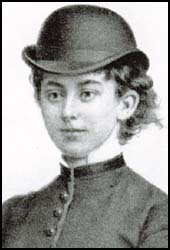
Lady Florence in the 1880s
Lady Florence Caroline Dixie
Traveller, War Correspondent, Writer & Feminist
25 May 1855 – 7 November 1905
Lady Florence Caroline Dixie, before her marriage Lady Florence Douglas, was a British traveller, war correspondent, writer and feminist.
Born in Scotland at Cummertrees, Dumfries, Lady Florence Douglas was the daughter of the 8th Marquess of Queensberry and his wife Caroline, daughter of General Sir William Clayton, 5th Baronet (1786–1866), Member of Parliament for Great Marlow. She had a twin brother, an older sister, and three older brothers.
In 1860, Lady Florence's father died in what was reported as a shooting accident, but was widely believed to have been suicide. In 1862 his widow converted herself and her youngest children, Florence and her brother James, to Roman Catholicism and took them to live in Paris for two years. This led the children's guardians to threaten Lady Queensberry with the loss of her children, a real possibility at a time when women's rights were very limited. In later life, Lady Florence campaigned on such injustices, highlighted in her book The Story of Ijarn (1903).
Lady Florence was educated at home and, after returning from Paris, in a convent school. She hated the school's repressiveness and the dogmatism of its religious teaching and took to writing poetry. Her childhood verses were published in 1902 as Songs of a Child, under the pseudonym 'Darling'.
From an early age, Lady Florence showed a love of sport and travel and a gift for writing.
On 3 April 1875, at the age of nineteen, Lady Florence Douglas married Sir Alexander Beaumont Churchill Dixie, 11th Baronet (1851–1924). The young couple lived at first at Bosworth Hall, near Market Bosworth in Leicestershire. They had two sons, George Douglas, who later became the 12th baronet, and Albert Edward Wolstan. In 1877, Lady Florence published her first book, Abel Avenged: a Dramatic Tragedy.
Weary of her life in English society, during 1878–1879 Dixie travelled with her husband, two of her brothers and Julius Beerbohm in Patagonia in South America.
In 1881, Dixie was appointed as a field correspondent of the Morning Post of London to cover the First Boer War (1880–1881) and the aftermath of the Anglo-Zulu War. She and her husband travelled to South Africa together. In Cape Town, she stayed with the Governor of the Cape Colony. She visited Zululand, and on her return interviewed the Zulu king Cetshwayo, who was being held in detention by the British. Her reports, followed by her A Defence of Zululand and Its King from the Blue Book (1882) and In the Land of Misfortune (1882), were instrumental in Cetshwayo's brief restoration to his throne in 1883.
Dixie played a key role is establishing the game of women's association football, organizing exhibition matches for charity, and in 1895 she became President of the British Ladies' Football Club.
Dixie held strong views on the emancipation of women, proposing that the sexes should be equal in marriage and divorce, that the Crown should be inherited by the monarch's oldest child, regardless of sex, and even that men and women should wear the same clothes. She was a member of the National Union of Women's Suffrage Societies, and her obituary in the Englishwoman's Review emphasized her support for the cause of women's suffrage.
In 1890, Dixie published a utopian novel, Gloriana, or the Revolution of 1900, which has been described as a feminist fantasy. During the 1890s, Dixie's views on field sports changed dramatically, and in her book The Horrors of Sport (1891) she condemned blood sports as cruel.
Dixie died 7 November 1905 at her home.
To make your own nomination download the nomination form here